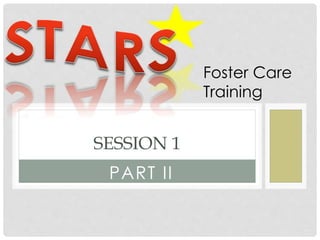Strs session 1 prt ii
- 1. PART II SESSION 1 Foster Care Training
- 2. âMAKING A DIFFERENCEâ VIDEO (MAKE NOTES ON RESOURCE 1-G FOR DISCUSSION.) âĒ Docudrama âĒ Purpose: 1. Give âBig Pictureâ Identify areas where you relate 2. Inspire and Challenge Differences in childrenâs reaction to placement Language (ex. F bomb)
- 3. DISCUSSION ïķWhat was your reaction? ïķ Was it what you expected? ïķDid you relate or feel comradery with anyone in particular? ïķ What was the foster parentâs role with birth parents? ïķ What message do you take away from it?
- 4. âĒ Removing Child âĒ Physical Intervention âĒ Birth parents in home âĒ Using humor (love languages) âĒ Losing privacy âĒ Different Outcomes CO-TRAINER'S OBSERVATIONS:
- 5. REVIEW QUESTIONS FROM 1-G (AS NEEDED)
- 6. (A) WHAT IS FAMILY FOSTER CARE? âĒ Service by child welfare agency for children who cannot be with birth family âĒ Opportunity for children and families to assess help âĒ Primary goal: reunification âĒ Possible permanent home when birth family not able
- 7. âĒLegal commitment to care for children as if born to self âĒHas to be agency approved âĒGives children chance to be part of a family âĒProvides caring, lifetime relationships (B) WHAT IS ADOPTION?
- 8. (C) WHY DO CHILDREN AND FAMILIES NEED CHILD WELFARE SERVICES? âĒ Alcohol âĒ Other drug abuse âĒ HIV/AIDS âĒ Special medical circumstances âĒ Physical abuse âĒ Sexual abuse âĒ Neglect âĒ Emotional maltreatment (poverty or homelessness should not be included) âĒ Feeling they are not able to raise their children
- 9. (D) WHAT ARE THE MISSION AND GOALS OF A CHILD WELFARE AGENCY? âĒProtect and Nurture âĒStrengthen families âĒProvide needed services âĒGoal: safety, permanence, and well- being
- 10. (E) HOW DO CHILDREN AND FAMILIES GET REFERRED FOR CHILD WELFARE SERVICES? 1. Reports from the community 2. Court because of childrenâs behavior issues
- 11. âĒ To help strengthen families in their home âĒ Severe trauma causing immediate removal âĒ Inability to fulfill necessary goals to keep children in home (F) WHY DO CHILDREN NEED FOSTER CARE SERVICES?
- 12. (G) WHY DO CHILDREN NEED ADOPTION SERVICES? âĒ Time for the family to become stronger and reunite has ended âĒ Child needs permanency âĒ Worker has done concurrent planning âĒ Parents rights terminated (by choice or judge)
- 13. (H) WHAT IS MEANT BY THE TERM COMPETENCIES? âĒ Clarifies knowledge and skills necessary âĒ Clarifies role in the foster childâs life
- 14. (I) WHAT ARE THE FIVE âCOMPETENCY CATEGORIESâ THAT FOSTER PARENTS AND ADOPTIVE PARENTS NEED? HOW COMPETENT DO PROSPECTIVE FOSTER PARENTS AND ADOPTIVE PARENTS NEED TO BE?
- 15. âĒ Protecting and nurturing children. âĒ Meeting childrenâs developmental needs and addressing developmental delays. âĒ Supporting relationships between children and their families. âĒ Connecting children to safe, nurturing relationships intended to last a lifetime. âĒ Working as a member of a professional team.
- 16. 1. Being aware. 2. Understanding and knowing. 1. Knowing how to apply knowledge and skills to their role. 2. Skill acquisition.
- 17. âĒ Protecting and Nurturing. âĒ Meeting developmental needs and addressing developmental delays. âĒ Supporting relationships between children and their families. âĒ Connecting children to safe, nurturing relationships intended to last a lifetime. âĒ Working as a member of a professional team.
- 18. âĒ Family and friends âĒ Agency and Childrenâs Service workers âĒ Foster parent associations and adoptive parent support groups âĒ Foster parent training programs âĒ The community, such as the place of worship
- 19. (I) WHAT ARE SOME OF THE CHALLENGES OF FOSTERING AND ADOPTING? âĒ Making the decision âĒ Impact on own family (marriage, kin, finances, neighbors, health, and employment) âĒ Shared parenting with the birth family âĒ Helping children with their emotions and behaviors âĒ Supporting cultural identity and connections âĒ Helping children transition to and from your home âĒ Helping children make lifetime attachments



















